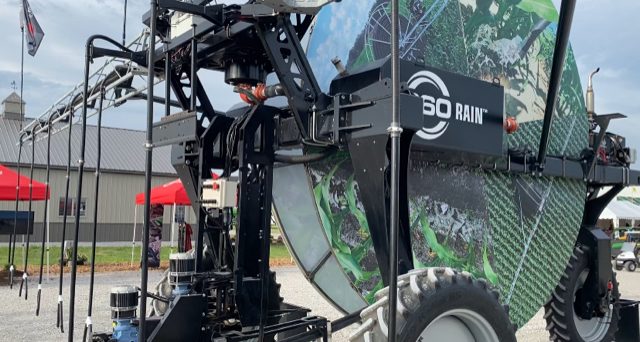By Gregg Sauder, as told to Julienne Isaacs
I'm a control freak. It's not that I don't trust the environment. If something goes wrong, I want to know that I've got an answer to fix it.
Our oldest son, Tim, runs research and development for 360 Yield Center. One day, he said to me, “What if we figured out an autonomous machine that could run 7 days a week, 24 hours a day and could band water like we band N?”
I said, "Tim, I'm fully convinced that we will not design a machine for sand country.” But then we wondered, what if we can figure out a way to do it at low volume?
Our 360 RAIN autonomous irrigation system is designed to use 40% of the water used by center pivot irrigation system. It follows paths created by the planter. A single machine lives in the field from the day of planting onward, connected to a well.
The center reel can hold 3,000 feet of hose. Why 3,000 feet? We know if we have a 160-acre field, a pivot is going to do 132 acres. That's just the reality. I own a bunch of them, and I understand that. So we put a well out by the road, and all we’re going to do is run a 6-inch PVC pipe from the well to a rain unit. Our goal is to water 100% percent of the field, including between the rows.
In central Illinois where we are, you do not need water to raise good corn. But in a 110-acre field with one 360 RAIN unit in it, the corn will be dramatically different. We’re going for a 50-bushel difference. So far, we've got 3 years of data. It was a 65-bushel difference the first year, 50 the second year and 40 bushels above the control in 2022.
360 RAIN also bands manure water that's just begging to find a cornfield. We have one in Ohio at a large dairy with a really good system — two lagoons and a leakage pit for all the runoff. This Ohio farmer’s manure application bill is over $1 million a year just to have drag lines come in. He ran 8 RAIN units this past year. He's a test bed for us. He said, "Gregg, with the extra silage I got and the manure savings, the machine almost paid itself in year 1."
His normal program is 200 pounds of nitrogen (N) on a silage field, but because he was bringing the manure on, he applied just 120 pounds. He got 30-bushel gains on that field, and he’ll pay for the unit in 4 years.
We've run a 360 RAIN unit in Florida on beach sand. They've never raised corn. We went into this white sand and were pumping solid manure out on the field, and the farmer was making silage for the first time. All of his manure comes to this lagoon. He's got a 10-inch PVC pipeline under pressure that runs for 2 miles down a country road with fields on the left and the right. It can be clean water, or it can be manure water. Whatever they decide at the switching station will run to all the fields.
On that Florida farm, we're running 3 RAIN units, each with 3-inch hose at 115 psi. Why are we running 3-inch hose? Because we’ve got to get through 3,000 feet of hose, and we're going to have a pressure drop. By the time the liquid gets to the end of the RAIN unit, it's at 10 psi. It goes from 115 all the way through 3,000 feet up the reel and down to the drop, where it's 10 psi. We need a lot of power.
We're powering the 360 RAIN machine off a 23-horsepower diesel motor set in the front that's generating DC current. It runs nonstop and extremely cheaply. We’ve got a 300-gallon tank, so all you have to do is fill this machine twice in a season, and it runs for 600 hours on one tank. You only have to change the oil in that motor once a year at the end of the year. It’s extremely easy.
In total, we have 40 rain unit machines going in 2023. 25 of them are manure machines in finishing hog buildings and dairies. We're having a lot of success.
Tim’s goal and my goal is to be running a 360 RAIN unit someplace every day of the year. You can never have a day off. When we are precision farmers, we plant corn every day.
If you're excited about it, get in line. We've exploded. When we showed off the 360 RAIN unit’s capabilities for manure, the phone rang off the wall. I had farmers that came up to me last year in Louisville, and they tried to hand me cash saying, "Gregg, we need it. We'll just pay you cash right now." I said, "No, that's not how we operate. We have to get it right first." Are we close? I think we are.
Can we get it right? I hope so. Can we make it bulletproof? I think we can. It all works off your iPhone. You start and stop it. You change your nitrogen pumps; you change your rates. You can put in variable speed; you can do variable rate nitrogen; you can do variable irrigation. If you can dream it, we can do it with that machine.
This is how we think as a family. These are the risks we take. I've invented, and I've had the privilege to work with some really cool engineers inventing some really cool stuff. What we’re working on now will change agriculture.



![[Technology Corner] Discussing AI’s Potential Impact on Service & Support](https://www.precisionfarmingdealer.com/ext/resources/2025/04/11/Discussing-AIs-Potential-Impact-on-Service--Support.png?height=290&t=1744385717&width=400)


